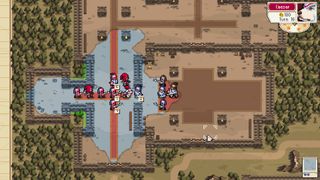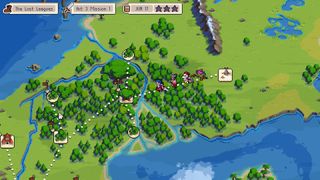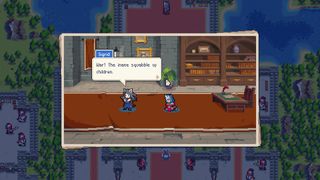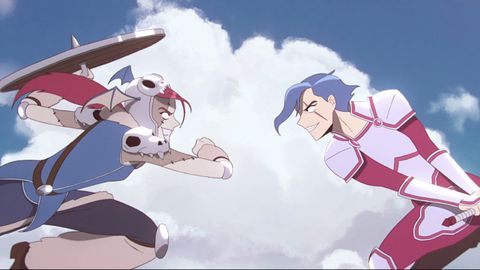Our Verdict
Brimming character and imagination, Wargroove occasionally loses its groove over long-winded core gameplay.
PC Gamer's got your back
What is it? Turn-based tactical strategy in which you play 12 adorable fantasy factions including an armoured Golden Retriever.
Expect to pay: $20/£16
Developer: Chucklefish
Publisher: Chucklefish
Reviewed on: Core i5-8400, GTX 1060, 16GB RAM
Multiplayer: 2 to 4 players local and online
Link: Official site
It’s very hard not to focus entirely on Cesar, Wargroove’s best boy and commander of his own army of warpups. Yes, dogs in shiny armour are a playable unit in this game. There is no violence against the four-legged soldiers, either—instead of dying, they just run away. If you’re not sold already, one of the other 12 commanders might do the trick. Don’t be fooled by the light-hearted tone, however—Wargroove is filled with creative, demanding challenges.
An easy comparison to reach for is Into The Breach. Both feature direct, turn-based confrontation between two factions who often use the landscape to their advantage. But Wargroove is more in every way; more factions, more units, more map, more more. This could sound overwhelming but getting started is actually really easy.
In the first few missions, as well as the arcade mode, your goal is generally to either defeat the opposing army’s commander or take their fortress. Capturing unallied buildings on the map or taking them from your opponent earns you money, which you can spend on new units or health. The campaign introduces the units one after another and gives you hints as to their use. The first time you’re up against airborne fiends, for example, you also gain ballistas and mages, both excellent against that particular type of enemy. These missions give you time to get to know units and their strengths and weaknesses without being overbearing. Knowing what type of soldier fares best against what enemy is crucial—a soldier with the distinct advantage can often win a battle in one strike. If they don’t, your opponent gets to counter.

Commanders are the most important characters, not only because they’re the strongest and look the coolest, but because each of them has a unique special ability, the so-called groove, which is charged by defeating enemies. Some grooves have defensive capabilities like extra health or defence, some are just good old fashioned special attacks.
While all armies share the same standard units, from small foot soldiers to massive golems and units for sea combat, they all have distinctly different looks that fit each commander and their lands. The people of the Japan-inspired Heavensong Empire build pagodas instead of stone castles, the golem of the Floran plant race looks like a giant tree. In terms of character design and animation, Wargroove is truly a standout.
Command & Conquer
The 30-plus missions of the single-player campaign follow a cute (if not particularly inventive) fantasy story. As well as standard conquering and destruction tasks, you’ll be rescuing prisoners from a fortress or helping refugees flee the site of a battle using wagons. If you prefer a quick challenge, there’s an arcade mode for each commander, and a puzzle mode in which you have to finish a mission within one round.

Wargroove’s weaknesses are its at times crushing difficulty and tendency to drag on. Positioning characters in the right spots for attacks and critical hits is already difficult enough. But Wargroove’s maps are huge, meaning you can spend round after round simply traveling to meet the enemy. It’s not always clear how damage is calculated, and I had to adjust it in the options to have a chance at more than one mission. Maps often have chokepoints such as bridges that can be difficult to circumvent, quickly leading to your soldiers literally queuing to get slaughtered. Flanking enemies is really important—but generating an army large enough to do so takes time.
A unit’s health also acts as its strength, leading to the problem common to games such as The Banner Saga where some characters simply act as cannon fodder, waiting on your replacement unit to make the trek from your barracks over to the actual fight. I’ve restarted some missions because it’s easier to start over than to move your half-dead unit away, heal them and then have them travel somewhere else.
The multiplayer for up to 4 people comes with its own maps and is organised by passing in-game match codes around. In 2-player mode, I found small maps, evenly split in the middle by bridges. Both players pick a commander and start out on equal footing, with the same amount of buildings to conquer on each side, including multiple barracks. In this mode it’s vital to take buildings and retain them, as you’re going for direct confrontation with no way to skirt each other.

Once you hold enough buildings, meaning money, and hold even just one barracks more than the other player, the game is all but decided. Victory is again achieved killing the commander or taking the fort, so real players are more likely than the CPU to aggressively bolster their forces to keep buildings surrounded. Whereas the campaign manages to switch things up, here the simple gameplay works to Wargroove’s detriment—I could have done with more variety to elevate this mode above its arcade counterpart.
Wargroove does invite you to try your own hand at level design as it comes with a brilliant set of highly intuitive tools you can use to create your own maps and even cutscenes. Chucklefish certainly wants you in for the long haul, but as I started skipping lengthy battle animations and came to dread any standard battle, I wondered whether less isn’t sometimes more.
Brimming character and imagination, Wargroove occasionally loses its groove over long-winded core gameplay.

